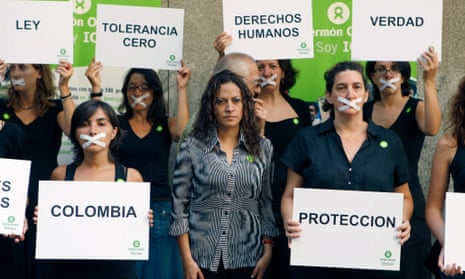After more than 50 years of conflict marked by widespread and systemic sexual violence, Colombia has established a national day to remember the appalling suffering experienced by so many women, whose plight has until now been largely ignored.
The first National Day for the Dignity of Women Victims of Sexual Violence caused by the Internal Armed Conflict takes place on Monday 25 May.
The establishment of this special day and the inclusion of survivors of sexual violence in the peace talks in Havana aimed at ending the conflict demonstrate how public awareness of the issue is growing.
It is hard to quantify the numbers affected. One survey estimates that between 2000 and 2009, almost half a million women suffered some form of sexual violence in areas affected by the conflict.
But that is just an estimate. The truth is, in Colombia, as in many other countries with poor prosecution records, most women tend not to report acts of violence against them. According to the same survey, some 82% of women who have survived sexual violence in Colombia, domestic and conflict-related, have not reported the attacks.
One of those at the forefront of demanding public recognition of this form of violence, and the impunity enjoyed by perpetrators, is Colombian journalist Jineth Bedoya Lima, who 15 years ago was abducted, tortured and raped by three paramilitaries while investigating a story about arms trafficking. For years after the attack she had remained silent.
The UN security council recently commended Colombia for introducing a landmark law that recognises that sexual violence can constitute a crime against humanity, and enhances the status of sexual violence survivors so that they can receive reparations, psychosocial support and free medical care.
But the problem remains as marked as ever, if not worse, despite the fact the government and the Farc, the main insurgent group, have been engaged in peace talks for more than two years. Following a freedom of information request made by Claudia Mejía, director of NGO Sisma Mujer – a Christian Aid partner – the National Institute of Forensic Services revealed that they recorded a 93% increase of sexual violence in the context of the conflict.
They also disclosed that there were 30% more killings of women by partners or ex-partners, and a sharp increase in threats against women’s human rights defenders.
Explaining this apparent escalation of gender violence is not straightforward. One suggestion has been that more women are coming forward to report violence. Also, as more women dare to speak up, more may be facing a backlash.
To women’s rights experts like Mejía, the persistence of violence against women, however, shows that there are other forces at work. She believes that the root causes are the deeply entrenched discrimination and inequality that condones gender violence and, crucially, the almost complete impunity, particularly of military perpetrators. For this reason, Sisma Mujer and other organisations recently filed a complaint with the International Criminal Court, calling for sexual violence to be recognised as a deliberate strategy and war crime, and condemning the failure to prosecute perpetrators.
There is reason to hope that the final peace deal may bring some change. Thanks to relentless pressure by women’s groups, the negotiators in Havana have established a special gender sub-committee and listened to testimonies of victims of sexual violence. These are positive and innovative steps, although long overdue given numerous, unfulfilled international commitments to incorporate women and gender perspectives in peace negotiations.
Yet, because these are negotiations, and because all parties continue to deny their responsibility for such crimes, there is a very real risk that perpetrators may get away with some form of amnesty, as has happened with a number of other peace deals in Latin America.
Failure to deal with abuses and allowing perpetrators of war crimes to walk free risks allowing such violence to become normalised, although the country may officially be at peace.
The peace deal that is sought is the opportunity to introduce radical change, and to shape a more equal society, tackling the root causes of the conflict. Guaranteeing justice and reparations for women and girls is an essential step towards a peace that is lasting and meaningful.
The work of women’s rights groups including Sisma Mujer, alongside initiatives such as choosing a national day to recognise victims of sexual violence are vital to maintain pressure on the peace negotiators.
- Lisa Maracani is Christian Aid’s Latin America advocacy and policy officer
